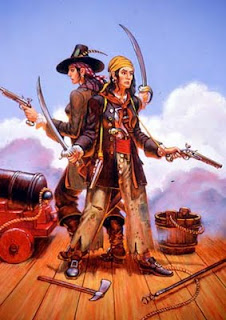

Today was one of the several during the growing season when Spiral Path Farm, whose CSA we sort of belong to (we split a weekly shipment with our neighbor) hosts an open house. So, despite the heat wave, we're zipping along roads west and up into Perry County, that I remember from the 60s as narrow two-lanes without even a painted stripe, and now have development sprouting everywhere. Between the small and large farms that look much the same, there are horrifically large McMansions growing like alien mushrooms.
The further west you go toward our destination around Loysville, though, everything looks the same, just a little more prosperous than 50 years ago. I was surprised by the number of motorcycle riders in groups, until we realized that this is Bike Weekend at the Fairgrounds in nearby Carlisle. Very few sport bikes, though; mostly large Harley types. I never see my beloved old British bikes on any of these event weekends -- how I'd like to see and hear a Vincent Shadow go by.
Just before we get to the private dirt-and-gravel lane that threads back to those organic acres, we pass by old (mid-18th century) Centre Presbyterian Church. I point excitedly to the large pavilion in the trees to the left; that's where the annual anniversary all-day "supper" is held near the end of each August, where Grandad took me (and much later, both of us) and I discovered homemade ice cream. I enjoyed the barbequed chicken and tried the pink "teaberry" flavor which is way too sweet for me now, but was pretty perfect for an 11-year-old. We'll be elsewhere on the date this year, but I think next year we'll go back (in time, too).
When grandad and I traveled over the ridge at Sterret's Gap where Cumberland County is left behind and Perry looms, he always told me the story of The Robber Lewis, which he had heard as a boy. I can't pass that way without remembering that Treasure Island-like tale. Born in 1790, David Lewis had a stellar career as counterfeiter and highwayman, operating all along the mountains that run southwest to northeast. He holed up in several caves in the immediate area, and it was near here that his most famous exploit as Pennsylvania's Robin Hood took place. He heard that a widow owed $20 for her half-year's rent and was about to lose her cow to the constable since she had not a dollar to her name. Lewis lent her the $20 and advised her to get a written receipt; after the constable left he ambushed the official on the road and made away with his loan and $40 more. He performed similar deeds, calling them "equalizing." In 1820, he died after a gun battle with a county posse. One hundred and forty years later, my grandfather was telling me his old story, accurate in every detail. Now it's yours.
Some of the road signs are poetic, referring to birds, sunshine and harmony; some are a little odd, like Dunkleberger Lane and Rambo Run. A directional sign that reads Bloserville: 2 has the "B" rubbed out. Country humor! No graffiti and no litter -- pleasantly surprising.
Spiral Path is not nearly as crowded as when we were here last year; probably because the heat is in the mid-90s. Their mint green tea and lemonade behind the stone and wood farmhouse is our goal right after we cut some sweet and purple basil, mint and Italian parsley. There are big boxes of produce to help yourself to, not all of it seconds. A few neighbors have vendor stands set up, with artisan bread, raw milk cheese (Nancy said this had a pretty strong flavor!), soups and honey. Two were there to promote their organic, grass-fed beef and lamb CSAs.
It looks like the back-to-the-land movement of the late 60s through the 70s has a new life through the CSA concept, and there are several restaurants throughout the area which source locally either somewhat or almost completely; we also see the products of family establishments in all the grocery stores, something that was rare before. Think about the lucky offspring and relatives who will never have to apply for a job, hard enough before in these rural areas but probably downright scary since 2008.
The refrigerator is crammed full; it was a good trip.









